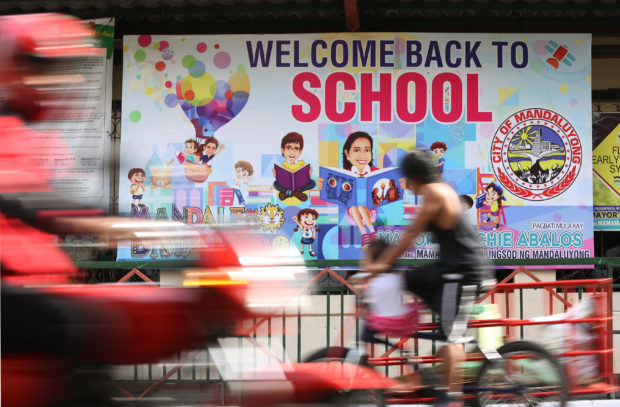Schools cope with usual opening woes

LET THE FUN BEGIN A banner depicting the joys of reading awaits students at Pleasant Hills Elementary School in Mandaluyong City on the opening of classes on Monday. —NIÑO JESUS ORBETA
Along with more than 46,000 public schools nationwide, Ramon Magsaysay High School (RMHS) in Cubao, Quezon City, will open its gates on Monday to welcome students for the new school year.
While the school is all set, accommodating its estimated 5,000 enrollees in 62 classrooms in nine buildings poses a challenge.
At least 300 senior high students would instead hold their classes in another school a few streets away, according to the school principal, Levita Ramos.
“We have been squatting at Marcelo H. del Pilar Elementary School, where we borrowed one building to accommodate our students,” Ramos told the Inquirer.
Double shifting
Double shifting will also be implemented to maximize use of available space.
Another problem loomed ahead. Ramos said the elementary school principal had asked RMHS to vacate its property, citing a high number of pupils this school year.
The principal, however, sees a silver lining in the new building exclusively for senior high school, to be named Fernando C. Amorsolo Senior High School. The building remains under construction and is expected to be completed only in October.
“Right now, I am still thinking of the best solution to accommodate all the children,” Ramos said. “Or else, where would we teach them?”
27.7M students in all levels
Despite persistent problems hounding every school opening, the Department of Education (DepEd) said it was prepared to welcome more than 27.7 million students from kindergarten to Grade 12 this year in both public and private schools, as well as in state universities and colleges.
Jesus Mateo, education undersecretary for planning and field operations, said classroom congestion, shortage of teachers, lack of facilities and other problems were more common in schools in highly populated communities than elsewhere.
“Our schools now have limited buildable space,” Mateo said in an interview with the Inquirer. “But the situation in thickly populated areas does not represent the entire country.”
DepEd data showed that between July and December 2017, at least 10,401 classrooms were built across the country and 4,622 more are under construction and will be completed by the second quarter.
During the school year, the department expects the completion of 28,000 more classrooms, Mateo said. Temporary learning spaces, meanwhile, have been set up while facilities are being constructed.
23.4M in public K-12
These classrooms, however, may still not be enough, given the rising number of students, Mateo said. “We do recognize that there are pockets of schools that still face the challenge of classroom shortage.”
In public schools, a total of 23.4 million students are expected to attend classes—2.6 million in kindergarten, 12.6 million in elementary, 6.7 million in junior high school (JHS), and 1.4 million in senior high school (SHS).
Some 4.1 million enrollees are expected in private schools, which will open in different dates after Monday.
Similar to last year, the bulk of this population, or 1.3 million, will be in JHS, followed by 1.2 million in SHS, and 1.1 million in elementary.
Despite the rising student population, average teacher-student ratio this school year is much better than that in previous years, Mateo said. In the elementary level, the average ratio stood at 1:33, and in the secondary level, at 1:26.
But Mateo said the ratio might exceed the average in certain schools due to various factors, such as buildable space, student population and location.
75,000 additional tutors
To further reduce class size and make learning conducive for students, the education department earlier said it would hire an additional 75,000 teachers.
The Department of Budget and Management approved the creation of new teacher posts in April, 40,642 of which would be for kindergarten and elementary.
Despite the improvements hailed by the DepEd, a teachers’ group assailed the condition of basic education in the country.
The Alliance of Concerned Teachers (ACT) said the number of teachers for the K-12 program, which had its first batch of graduates this year, had remained insufficient.
“Teachers remain as beasts of burden, as they perform other administrative work and act as librarians, clerks, custodians and guidance counselors, on meager salary,” ACT chair Benjamin Valbuena said in an interview.
Only 39,284 nonteaching personnel were supporting the more than 687,000 teaching positions, he said,
Textbook shortage
Valbuena also cited a shortage of 127.9 million textbooks in public schools. Teachers, he said, were being forced to spend their own money to photocopy and print out learning and instructional materials for their students.
Mateo said that while some grade levels might not have yet received textbooks, learning guides were made available to them. Procurement laws, however, have made it harder to fully provide materials to all students, he said.
“Sometimes we just upload these materials [online] and let the divisions and schools print them out,” he said, adding that a budget has been allocated for them.
“Admittedly, the DepEd is exerting efforts, but it is not enough,” Valbuena said. “Basic problems, such as class size, proper ventilation and water supply, enough learning materials and salary for teachers, still need to be addressed.”
Despite these challenges, Mateo said the department was working to continuously improve basic education in the country.














